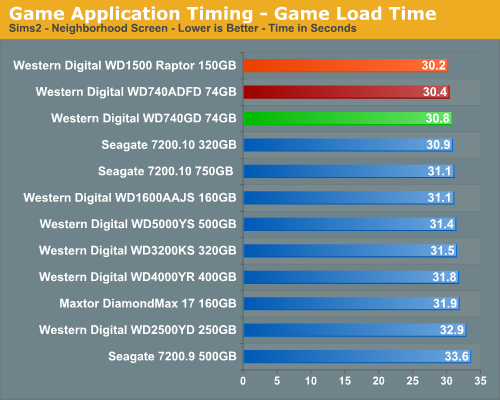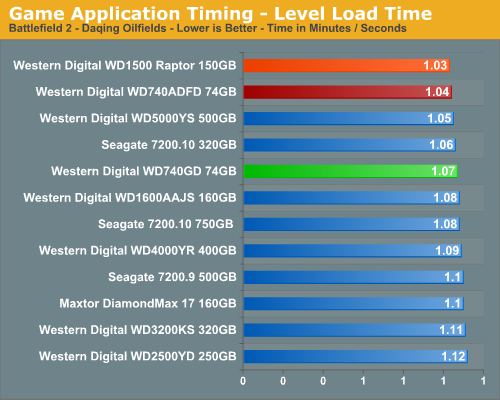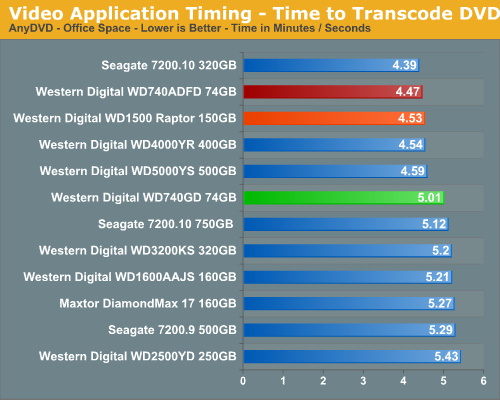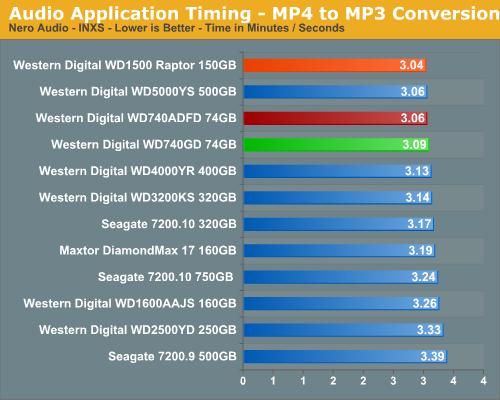Western Digital WD740ADFD: Bottled Lightning
by Gary Key on February 7, 2007 3:30 AM EST- Posted in
- Storage
Actual Application Performance
Our application benchmarks are designed to show application performance results with times being reported in minutes / seconds or seconds only, with lower scores being better. While these tests will show some differences between the drives it is important to understand we are no longer measuring the pure performance of the hard drive but how well our platform performs with each individual drive. The performance of a hard drive is an integral part of the computer platform but other factors such as memory, CPU, core logic, and even driver choice can play a major role in determining how well the hard drive performs in any given task. Also worth noting is that new features of Windows Vista - specifically SuperFetch - can further reduce the measured performance differences between hard drives.
Game Load Test
Our Sims 2 - Open for Business test measures the time it takes to load the initial portion of the game. Our application timer starts when the game icon is initiated until the neighborhood menu appears.

The results are basically the same as our iPeak results as the WD Raptor series continues to lead all drives, but the performance differences are not as drastic once we take into account the entire platform. The times might not show that great of a difference but over the course of game play we could always identify the system with a Raptor in it. Of course, our ears generally knew first but we could tell the differences in game startups and level loads with a Raptor equipped drive.
Game Level Load
This test centers on the actual loading of a playable level within our game selections. We run Battlefield 2 and measure the time it takes to load the Daqing Oilfields level. Our application timer begins when the start single player icon is initiated and ends when the join game icon is visible.

The WD1500ADFD Raptor continues its pattern of being the best available drive for the gaming enthusiast and our subjective opinion also matches the test scores. Of course, the difference in load times between the Raptor and the WD2500YD drive was only nine seconds but it seemed like an eternity as we repeated the tests for each drive. The WD740ADFD finishes right behind the WD1500ADFD once again proving that the improved firmware, increased cache size, and single platter design allows it to keep up with the 150GB drive.
AnyDVD 5.9.6
Our next test has us utilizing the "ripping" function of AnyDVD to copy the Office Space DVD file from our source drive to our test drive. Our DVD features 29 files totaling 7.55GB of data and is an excellent test for determining the write speed of a drive.

Our Seagate Barracuda 7200.10 320GB drive scores extremely well in this test. The WD740ADFD also finishes ahead of the WD1500ADFD in this test where write speeds are extremely critical for the performance of the drive.
Nero Audio Encode
Our last test has us utilizing the audio encoding functions of Nero to convert our INXS Greatest Hits audio files in MP4 format to a high quality variable rate MP3 file for our portable player. Our test features 16 files totaling 137MB of data and is an excellent test for determining the read and write speed of a drive.

The test results show once again the amount of time a fast hard drive like the WD Raptor can save over the course of audio or video file manipulation session. In this case, the WD1500ADFD finishes just ahead of the 74MB Raptors where it handles small block sizes in sequential order slightly better.
Our application benchmarks are designed to show application performance results with times being reported in minutes / seconds or seconds only, with lower scores being better. While these tests will show some differences between the drives it is important to understand we are no longer measuring the pure performance of the hard drive but how well our platform performs with each individual drive. The performance of a hard drive is an integral part of the computer platform but other factors such as memory, CPU, core logic, and even driver choice can play a major role in determining how well the hard drive performs in any given task. Also worth noting is that new features of Windows Vista - specifically SuperFetch - can further reduce the measured performance differences between hard drives.
Game Load Test
Our Sims 2 - Open for Business test measures the time it takes to load the initial portion of the game. Our application timer starts when the game icon is initiated until the neighborhood menu appears.

The results are basically the same as our iPeak results as the WD Raptor series continues to lead all drives, but the performance differences are not as drastic once we take into account the entire platform. The times might not show that great of a difference but over the course of game play we could always identify the system with a Raptor in it. Of course, our ears generally knew first but we could tell the differences in game startups and level loads with a Raptor equipped drive.
Game Level Load
This test centers on the actual loading of a playable level within our game selections. We run Battlefield 2 and measure the time it takes to load the Daqing Oilfields level. Our application timer begins when the start single player icon is initiated and ends when the join game icon is visible.

The WD1500ADFD Raptor continues its pattern of being the best available drive for the gaming enthusiast and our subjective opinion also matches the test scores. Of course, the difference in load times between the Raptor and the WD2500YD drive was only nine seconds but it seemed like an eternity as we repeated the tests for each drive. The WD740ADFD finishes right behind the WD1500ADFD once again proving that the improved firmware, increased cache size, and single platter design allows it to keep up with the 150GB drive.
AnyDVD 5.9.6
Our next test has us utilizing the "ripping" function of AnyDVD to copy the Office Space DVD file from our source drive to our test drive. Our DVD features 29 files totaling 7.55GB of data and is an excellent test for determining the write speed of a drive.

Our Seagate Barracuda 7200.10 320GB drive scores extremely well in this test. The WD740ADFD also finishes ahead of the WD1500ADFD in this test where write speeds are extremely critical for the performance of the drive.
Nero Audio Encode
Our last test has us utilizing the audio encoding functions of Nero to convert our INXS Greatest Hits audio files in MP4 format to a high quality variable rate MP3 file for our portable player. Our test features 16 files totaling 137MB of data and is an excellent test for determining the read and write speed of a drive.

The test results show once again the amount of time a fast hard drive like the WD Raptor can save over the course of audio or video file manipulation session. In this case, the WD1500ADFD finishes just ahead of the 74MB Raptors where it handles small block sizes in sequential order slightly better.










26 Comments
View All Comments
DrMrLordX - Wednesday, February 7, 2007 - link
That article certainly changed my perspective on Raptor performance. It's clear that the older 74 gig Raptor just can't hang with the big boys. I had heard that the new 74 gigger was the fastest, but your results seem to refute that entirely. The 150 gigger wins out more often than not.the Chase - Wednesday, February 7, 2007 - link
Yeah I'm glad AT did this review as haven't seen much on the new 74GIG model. Now what I'd LOVE to see is how the new 36GIG models do in all of this and how 2 of them in RAID would compare to the bigger drives.Any chance of slipping in the new 36GIG model sometime Gary?
Thanks for the review.:)
Gary Key - Thursday, February 8, 2007 - link
Hi,We will have numbers on the 36GB ADFD in the next roundup. Also, we will be updating our RAID article from 2004 to see if the landscape has changed in regards to RAID 0 performance on the desktop but more importantly taking a serious look at RAID 1, 0+1, 10, and 5 on today's motherboard chipsets. We plan on this in March but the next HD article to go up will include the new 500GB drives from all suppliers.
DigitalFreak - Wednesday, February 7, 2007 - link
I find it surprising that the older model 74GB Raptor beats the new 74GB model in nearly every test.DigitalFreak - Wednesday, February 7, 2007 - link
heehee Never mind. I got the model numbers mixed up. :-)Jedi2155 - Wednesday, February 7, 2007 - link
I find it even more interesting that a 320 GB 7200.10 beat out a 750 GB 7200.10 in a number of benchmarks.I also appreciate the mention of the Dell OEM Raptors with myself being a proud owner of a 160 GB Raptor :). (Which I got for a mere $160)